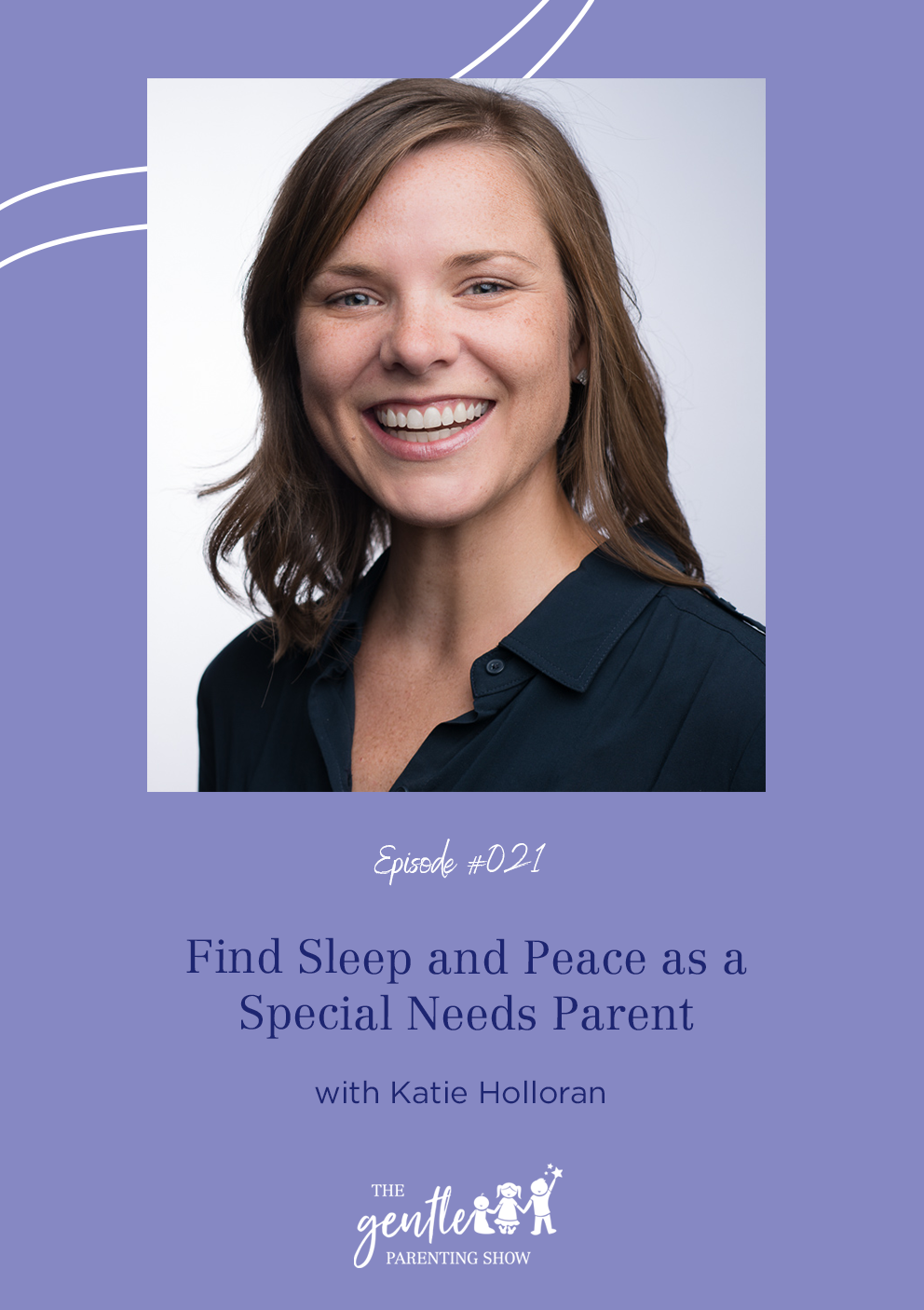In today’s episode of The Gentle Parenting Show, Kim sat down with long-time gentle sleep coach, Katie Holloran. Katie co-authored a book with Kim, the Good Night Sleep Tight Workbook for Children with Special Needs. Katie has run her own business supporting families as a teacher, special education teacher, behavior analyst, and sleep coach since 2005. Prior to starting her business, Katie graduated from Georgetown University and then earned her Masters in Special Education from George Washington University. While teaching and working with children with Autism and Developmental Delays in Public, Private, Charter schools as well as in-home therapy programs in the DC area, Katie completed the coursework and obtained her Board Certification in Behavior Analysis in 2010.
Kim and Katie discuss some of their best practices for getting children with special needs to sleep. This includes tips for bedtime routines and the best products that can be help in the sleep training process.
Behavioural Sleep Problems
Sleep problems can occur in 20-30% of children, even those without special needs. For the purposes of this podcast, we qualify special needs as any child with autism or developmental delays. Katie references a recent study that was focused specifically on children with special needs. She likes to reference this study because it had a large study group – over 700 children with developmental delays and over 700 children without. This study showed that sleep issues are more than twice as common with children who have special needs and that 80% of parents of children with special needs report some sort of sleep issue with their child. So, is there any hope for sleep? Yes, and we’ll explain how.
Will Special Needs Children Always Struggle with Sleep?
While sleep might not come as easy for children with special needs, it is a skill that can be taught and learned. Katie reassures parents that with behavioral support, children with special needs (and their parents) can experience restful sleep. She says “sleep is a skill that can be taught and learned, and just because you have a certain diagnosis in your family, that doesn’t mean that you’ll never sleep again.” Isn’t that a great reassuring statement?
If you have a team of therapists, doctors, and specialists for your child, use them to be your sounding board for sleep issues. Your doctor can tell you what is developmentally appropriate based on your child’s delays. An occupational therapist can help you with sensory techniques. A teacher or caregiver can help support you and have discussions with your child about sleep.
Beware of advice that tells you to take extreme measures to get your child to sleep, like leaving them alone in their room to cry it out and fall asleep. While this can be mentally hard for any baby or child, it is especially taxing on children with special needs and is not the only way to get sleep.
Proactive Steps for Bedtime
Katie’s biggest advice for any special needs family she works with is to be proactive with bedtime. This entails two things: deciding on bedtime and laying out a bedtime routine for your child. For a bedtime, Katie recommends anytime between 7:00 pm-8:30 pm. Remember that this is going to be bedtime, not start the bedtime routine time, so work backward to determine what time you need to start the bedtime routine to get your child asleep on time. Once you’ve determined that, figure out a system that works best for your child in their bedtime routine.
Through her work, Katie has found that children with special needs work best having a routine laid out for them in a visual way. You can decide what this looks like for your child, but Katie offers a couple of ideas. One idea is to have pictures of your child doing each step of the bedtime routine laid out in order, so they can look at pictures of themselves and create some sort of memorized routine. Another way is to create a checklist for your child to check off every step of the routine. She also recommends putting pictures and bedtime routine steps into a book for your child to follow. Katie says to think small with these steps – brush teeth, say goodnight to sibling(s), go potty, wash hands, sing 1 song, etc. She also recommends being as specific as possible so your child knows what to expect. Having visual cues for bedtime takes the mental burden off the parent and the child at the end of the day.
They’re In Bed – Now What?
Getting your special needs child into bed is one thing – keeping them there is another! Katie recommends a gentle and gradual approach, like the Sleep Lady Shuffle. Changing things, especially sleep, with your special needs child can’t be all or nothing – changes need to come incrementally. For example, if you previously co-slept with your child, step 1 can be rubbing your child’s back until they fall asleep. Do this for however many nights you see fit, then move on to a further step. The next step can be as big as positioning yourself at the bottom of the bed, not touching your child, or as small as only rubbing every few minutes. You know your child’s limits best, and taking gradual, incremental steps will give you lasting results. Take however many small steps you need until your child is successfully falling asleep independently. Remember, this time frame will look different for everyone.
Products and Strategies to Help
Through her years of work with special needs children, Katie has found a few products and techniques that can be helpful for helping children achieve sleep. Keep in mind that these products are tools, not magical wands that will get your child sleeping through the night tomorrow! Katie also recommends you talk to your occupational therapist to see if there are specific products they recommend.
One product that’s been effective in helping special needs children get to sleep is a weighted blanket. This is mainly for older children. For younger children in cribs, Katie recommends vertical crib liners. This is because a lot of younger children with special needs may bang their heads against the crib. These liners give a little extra reassurance to parents. She also recommends a colored clock or sound machine system for older children. These can be very effective in teaching older children when it’s time to stay in bed and when it’s ok to get out.
In this episode, she also discusses an amazing curriculum called The Zones of Regulation. This curriculum helps children with everything from self-regulation to breathing techniques. Although it’s not directly related to sleep, learning these techniques in the curriculum can help your special needs child develop the skills they need to get to sleep.
Don’t Stretch Your Bandwidth
Katie’s favorite saying is “it’s only a problem if it’s a problem”. What she means by this is that if something is working for you – let it work for you! Don’t feel the pressure to change anything you’re doing if it’s working. You should only be concerned if it’s a health or safety issue. Otherwise, let yourself do what works for you. Sleep is a wonderful gift for your special needs child. It can help them perform better in every area of their life.
Connect with Katie
- Katie’s WEBSITE






